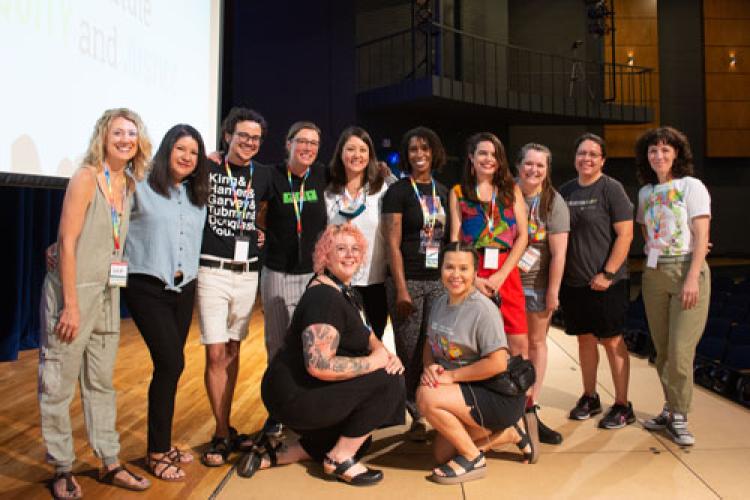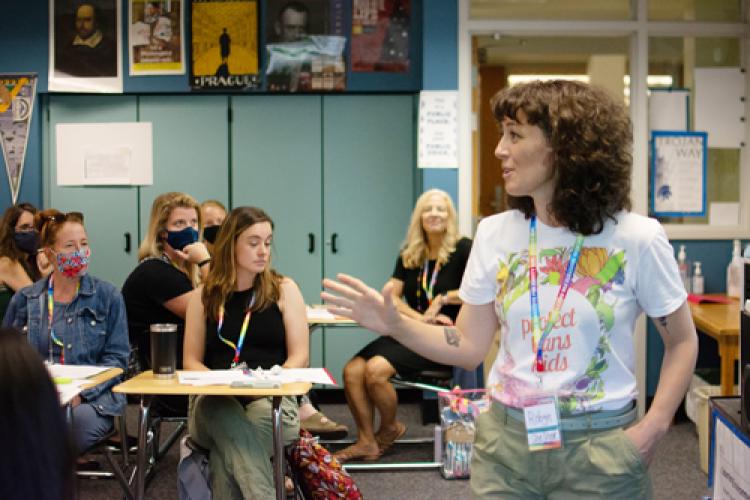Community and liberation by design
A Queer Endeavor’s 2021 Educator Institute for Equity and Justice
Who are we, and why did we come together?

To engage educators locally and from afar, we used a robust online platform and offered most sessions in a hybrid format. Our attendance soared to over 500 in-person and online participants.
In this historic moment, when so many educators doing diversity, equity and inclusion work are defending against well-organized attacks on critical race theory and queer- and trans-affirming policies and practices, realizing our vision for the EIEJ felt urgent. Moreover, as people who bring diverse identities and lived experiences to our collective’s work, we have experienced the struggle to come together within community—that is, to build alliances, put egos aside, and truly care for and love one another as a model of the world we dream of. For these reasons, investing in our own and one another’s transformation was just as crucial as organizing the EIEJ.
What is collective liberation, and why does it matter?

It means acknowledging that we all have issues of equity and justice that take us “out of (our) depth,” as Charlene Carruthers says, and that we all have learning to do. It means owning the contributions we make to systems of oppression and changing our practices when we know better.
Drawing on Adrienne Maree Brown’s vision of movement as sanctuary, moving toward collective liberation involves creating humanizing spaces in which our experiences as people “who have experienced and caused harm are met with centered, grounded invitations to grow.”
What did moving toward collective liberation look like for our team and at the EIEJ?
To embody the spirit of collective liberation and to emulate the learning spaces we sought to inspire, our team engaged in humanizing practices of care and curiosity. One of those practices was “the humanizing syllabus.”
To embody the spirit of collective liberation and to emulate the learning spaces we sought to inspire, our team engaged in humanizing practices of care and curiosity. One of those practices was ‘the humanizing syllabus.’”
Weekly, a team member shared a text of personal significance. The collective witnessed that person as they spoke about where they saw themselves, their lived experiences and connections to their work in the text. Often vulnerable and emotional, these witnessing sessions were a crucial mediator of the transformative culture we created with and in the collective where we felt free to bring our full humanity.
To build intersectional networks of solidarity, community and healing at the EIEJ, we designed “meet in the middle” spaces in which participants came together at the end of each day to talk across sessions they attended. As facilitators of those spaces, we designed opportunities for participants (and for ourselves) to grapple with moving toward collective liberation as intersectional work that requires learning, acting and growing together, in community, rather than in silos. Drawing on various modalities such as somatic reflection, playing in a makerspace and engaging in dialogue with “critical friends,” attendees and facilitators connected around our take-aways, reservations, insights and inspirations from the conference.
What are we taking away from this experience?
The EIEJ left us with critical hope in the power and possibility of bringing together educators who embrace classrooms and learning spaces as vehicles for justice, yet seldom have opportunities to engage in collectives that are transformative: “where we support each other to grow rather than compete with or tear each other down,” as the Catalyst Project puts it. We call this hope critical because without it, we can’t get free.
This article was written by several members of A Queer Endeavor’s Educator Institute for Equity and Justice team of “angelic troublemakers.” Meet the planning team and learn more about EIEJ at aqe-eiej.org.

